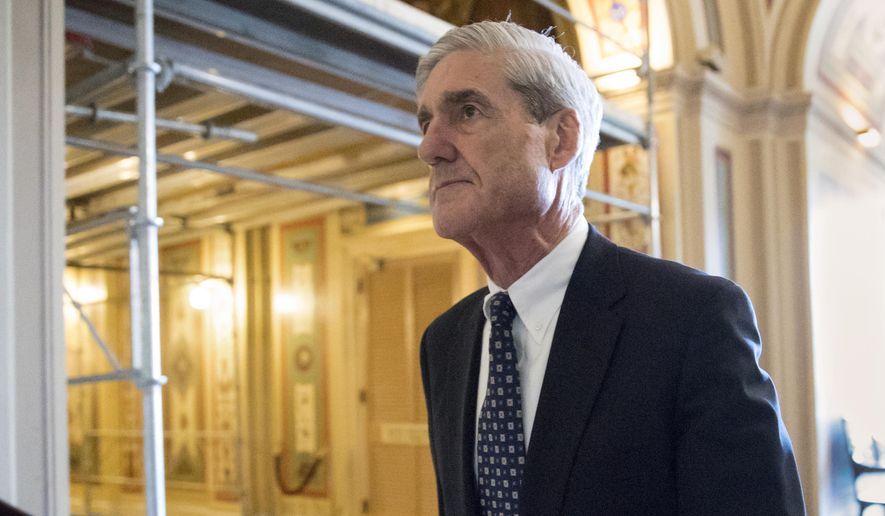With the midterm elections in the rearview mirror and new confusion swirling around who will overseeing his work, special counsel Robert Mueller is widely expected to soon break his silence on the findings of his probe into Russia-election meddling and possible collusion in the 2016 presidential election.
As he has throughout his tenure, Mr. Mueller issued no statement on the head-spinning events of Wednesday, including President Trump’s de facto firing of Attorney General Jeff Sessions and the appointment of a temporary replacement with an uncertain mandate over his investigation.
Over the next month, the former FBI director reportedly has multiple important court hearings scheduled, in addition to sentencing deadlines for key cooperating witnesses, as his 19-month-long investigation appears to be nearing a climax.
But how much of his work, which was last estimated to have cost taxpayers roughly $17 million, will actually see the light of day remains a subject of intense political and legal debate.
To Mr. Trump’s repeated fury, Mr. Sessions, a key adviser in the 2016 presidential campaign, recused himself last year from all Department of Justice investigations into Russian interference, leaving Deputy Attorney General Rod Rosenstein as Mr. Mueller’s supervisor. Acting Attorney General Matthew Whitaker, Mr. Sessions chief of staff named as his temporary replacement by Mr. Trump Wednesday, has in the past expressed deep skepticism over the scope of the probe and now replaces Mr. Rosenstein as the primary supervisor of the probe.
Asked Wednesday if Mr. Whitaker would take control of the probe, Justice Department spokeswoman Sarah Flores told the Associated Press that the acting attorney general would be “in charge of all matters under the purview of the Department of Justice.”
Top House Democrats, now in the majority, are reportedly planning to invite Mr. Mueller to testify on Capitol Hill in televised hearings if they think the White House is trying to inhibit the special counsel or bury his findings.
House Democratic leader Nancy Pelosi, the likely next House speaker, publicly pledged to make sure Mr. Mueller’s “documentation is preserved.” Her Senate counterpart, Democratic Minority Leader Chuck Schumer of New York, added it was “imperative” Mr. Mueller’s work be shielded from political interference.
Should the probe continue, prospective Democratic chairmen on multiple congressional panels, including the Judiciary, Intelligence and Oversight committees, have said they will attempt to stay out of Mr. Mueller’s way as they pursue their own probes of the administration. If Mr. Trump tries to shut down the probe, they have vowed to use their subpoena power to publicize Mr. Mueller’s findings.
But a major legal debate still rages over what type of report Mr. Mueller will issue, as Justice Department regulations mandating the presentation of his conclusions to Congress or the public are ambiguous
Some argue Mr. Mueller can only deliver his findings to his superiors at the Justice Department for them to deal with. But in the Watergate investigation, special prosecutor Leon Jaworski gave a basic outline of his findings to the House Judiciary Committee, which in turn formed the basis for impeachment articles against President Nixon.
At the other extreme, Mr. Mueller could follow in the footsteps of special prosecutor Ken Starr in his investigation of President Clinton’s failed Whitewater real estate deal.
Mr. Starr delivered a report more than 400 pages long that was quickly made public and covered not just Whitewater but a detailed accounting of the extramarital affair between Mr. Clinton and former intern Monica Lewinsky.
Mr. Mueller’s support on Capitol Hill is not limited to Democrats, with Sen. Lamar Alexander of Tennessee and Sen.-elect Mitt Romney of Utah among the Republicans issuing statements warning against trying to shut down Mr. Mueller’s work.
Sen. Susan Collins, Maine Republican, warned on Twitter Wednesday that it is “imperative that the administration not impede the Mueller investigation.”
Mr. Mueller “must be allowed to complete his work without interference — regardless of who is AG,” she added.
• Dan Boylan can be reached at dboylan@washingtontimes.com.




Please read our comment policy before commenting.